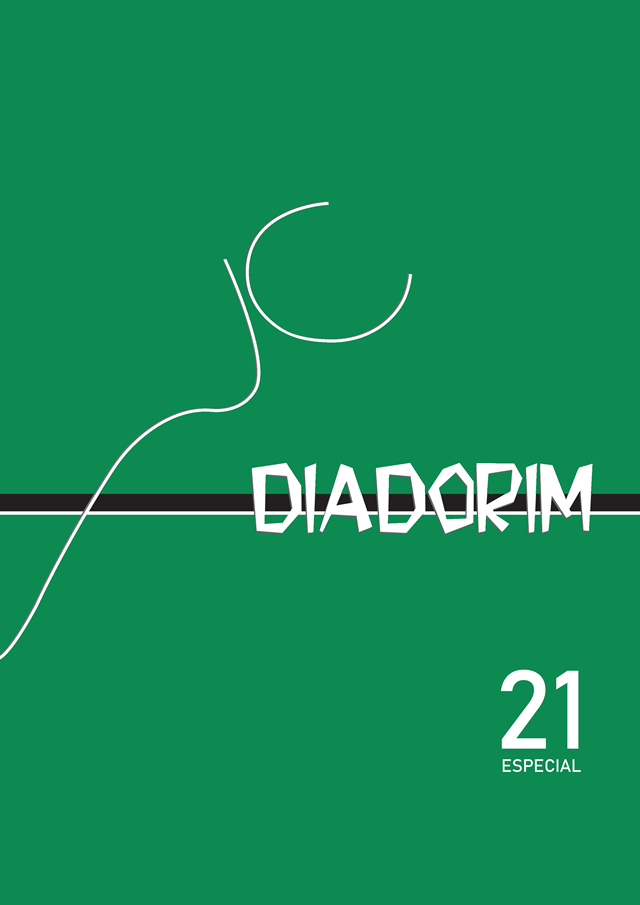Gender and emotion in exile: Evelyn Scott's brazilian experience
DOI:
https://doi.org/10.35520/diadorim.2019.v21nEspa26101Keywords:
Evelyn Scott, Cyril Kay-Scott, discourse, gender, emotion, exile.Abstract
In late 1913, the American writer Evelyn Scott eloped with Cyril Kay-Scott, a well-known physician who was, then, married, father of four, and more than twice her senior. Without passports, taking with them very little money, the couple fled first from New Orleans to New York, then to London, finally to Brazil, where they eventually faced poverty, starvation, and almost complete isolation in the backlands of Bahia. Using concepts derived from Critical Discourse Analysis, Anthropology of Emotions, Gender Studies, and Exile Studies, this work aims to examine issues of gender and emotion in Evelyn Scott’s autobiographical account of her Brazilian self-imposed exile which extended from 1914 to 1919. The analysis is based on her autobiography Escapade (1923) and on part of Cyril Kay-Scott’s Life is too short (1943). Results indicate that, although the couple suffered a great deal in exile, the experience proved to be particularly painful for Evelyn Scott, who did not speak a word of Portuguese. Besides, she was pregnant and had to go through a difficult childbirth in the outskirts of the city of Natal. The entire context contributed to make gender and emotion crucial aspects for Evelyn Scott’s experience both as a woman and as a writer.
References
ABU-LUGHOD, L. & LUTZ, C. Introcuction. In: Language and the politics of emotion. Cambridge: Cambridge University Press, 1990.
ADORNO, T. Minima Moralia. Trans. E.F.N. Jephcott. London: Verso, 1978.
BUTLER, J. Gender Trouble: Feminism and the subversion of identity. New York: Routledge, Chapman & Hall, 1990.
BRADBURY, M. & MCFARLANE, J. (eds). Modernism: A Guide to European Literature 1890-1930. London: Penguin, 1991.
CALLARD, D. A. “Pretty Good for a Woman”: The Enigmas of Evelyn Scott. New York: Norton, 1985.
CAMERON, D. Feminism and Linguistic Theory. London: Macmillan, 1985.
ECKERT, P. & McCONNEL-GINET, S. Language and Gender. Cambridge: Cambridge University Press, 2003.
FAIRCLOUGH, N. Language and Social Change. Cambridge: Polity, 1992.
FOWLER, R. Language in the News: Discourse and Ideology in the Press. London: Routledge, 1991.
FOUCAULT, Michel. The Archeology of Knowledge and the Discourse on Language. New York: Pantheon, 1972.
GOFFMAN, E. Gender Advertisements. New York: Harper & Row, 1977.
HOCHILD, A. The managed heart. Berkley: University of California Press, 1985.
LAKOF, R. Language and Woman’s Place. New York, San Francisco, London: Harper & Row, 1975.
LEADER, Z. On life-writing. Oxford: Oxford University Press, 2015.
MCKENNA, W. Gender: an ethnomethodological approach. Chicago: University of Chicago Press, 1978.
MAUN, C. Mosaic of fire: the work of Lola Ridge, Evelyn Scott, Charlotte Wilder and Kay Boyle. South Caroline, University of South Caroline Press, 2012.
SAID, E.W. Reflections on Exile and Other Essays. Cambridge: Harvard U P, 2000.
SCOTT, E. Escapade. Afterward by Dorothy M. Scura. Charlottesville and London, University Press of Virginia, 1995 [1923].
SPENDER, D. Man made Language. London: Routledge & Kegan Paul, 1980.
VAN DIJK, T. Social cognition and discourse. In GILES, H. and ROBINSON, P. Handbook of Language and Social Psycology, Chichester: Academic Press, 1990.
WHITE, M. Fighting the current: the life and work of Evelyn Scott, Louisiana: Louisiana State University Press, 1998.
Downloads
Published
Issue
Section
License
Copyright transfer -- Authorization to publication
If the submitted article is approved for publication, it is already agreed that the author authorizes UFRJ to reproduce it and publish it in Diadorim: revista de estudos linguísticos e literários, the terms "reproduction" and "publication" being understood as defined respectively by items VI and I of article 5 of Law 9610/98. The article can be accessed both by the World Wide Web (WWW) and by the printed version, with free consultation and reproduction of a copy of the article for the own use of those who consult. This authorization of publication is not limited in time, and UFRJ is responsible for maintaining the identification of the author of the article.

The journal Diadorim: revista de estudos linguísticos e literários is licensed under a Creative Commons Attribuition-NonCommercial 4.0 International (CC BY-NC 4.0).

